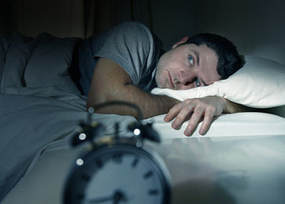|
Guest Post By: Sergio Valdes, CPT, CES, USAW L1 Coach  Have you wondered how many hours you’re really supposed to sleep every night? We’ve heard the usual claims that 7-8 hours is ideal.. But what do the studies really say? Work, family and social events keep us from going to bed early, but how exactly does that affect the body? Matthew Walker, Director of the Center for Human Sleep Science at the University of California, Berkeley, explains how sleep deprivation affects us daily. Through his work and published studies, he has shown that there is an incredibly large correlation between how long you sleep and how long you’ll live.
When a person goes to sleep, the brain begins to recharge, reorganize itself and remove toxic waste products which have accumulated normally throughout the day. This demonstrates that good sleep helps clear the brain and allows it to maintain normal function. Each phase of the sleep cycle is unique and different in restoring and rejuvenating the brain for optimal function. When sleep is shortened or deprived, the active process of the glymphatic system does not have time to perform that function of maintenance. As a result, toxins can build up, and the effects will have negative consequences in regard to cognitive abilities, behavior, and judgment. One study conducted by the National Sleep Foundation (NHS) showed that adults aged 45 and older that slept less than 6 hours each night were 200% more likely to have a heart attack or stroke during their lifetime compared to participants who got seven or eight hours. According to the NHS, sleeping less has also been associated with an increased risk of weight gain, developing Alzheimer’s, and relapses in additional disorders. According to the National Institute of Health (NIH), habitual short sleep duration is associated with hypertension (high blood pressure), especially during middle age. Insomnia with objective short sleep duration also is associated with increased hypertension risk. On a basic level, lack of sleep also lowered participants’ immune systems. Another prominent issue is drowsy driving. Drowsy driving has become common, and it is a dangerous issue for people that get poor sleep quality. Drowsy driving has similar effects to driving while under the influence of alcohol. According to the National Sleep Foundation (NSF), being awake for 18 hours straight makes you drive like you have a blood alcohol level of .05 (for reference, .08 is considered drunk). If you’ve been awake for a full 24 hours and drive—say, after a night where you just couldn’t fall asleep, you would be impaired in a similar way as if you have a blood alcohol level of .10. These studies come at a time where lack of sleep is usually correlated with a belief that one tends to work “harder” or shows an increased sense of “dedication” to one's career or work. During my time in school, it seemed as though it was always a competition amongst peers to express how little one slept in order to cram for study time or partying and drinking until early morning hours. As a personal trainer, I get to witness the effects of sleep deprivation in most of my clients on a regular basis. The ability to function physically and cognitively is drastically impaired after a night of short sleep. Clients that do not sleep the recommended amount of time show a much lower sense of motivation and physical endurance. It also has a large effect on how well the person can stick to their nutrition plans, as lack of sleep has been shown to increase the effect of the hormone that makes you hungry (Ghrelin), and a suppression of the hormone that makes you feel satisfied after a meal (Leptin). So what are some steps we can take to make sure we get better sleep at night? Dr. Walker recommends:
1 Comment
Your comment will be posted after it is approved.
Leave a Reply. |
Meet Your TherapistJessica has been in Austin, TX for the past four years. She grew up in Idaho and attended PT school at Idaho State University. She completed an Orthopaedic Residency and became a Board Certified Orthopaedic Clinical Specialist in 2016. Archives
February 2022
Categories
All
|

 RSS Feed
RSS Feed